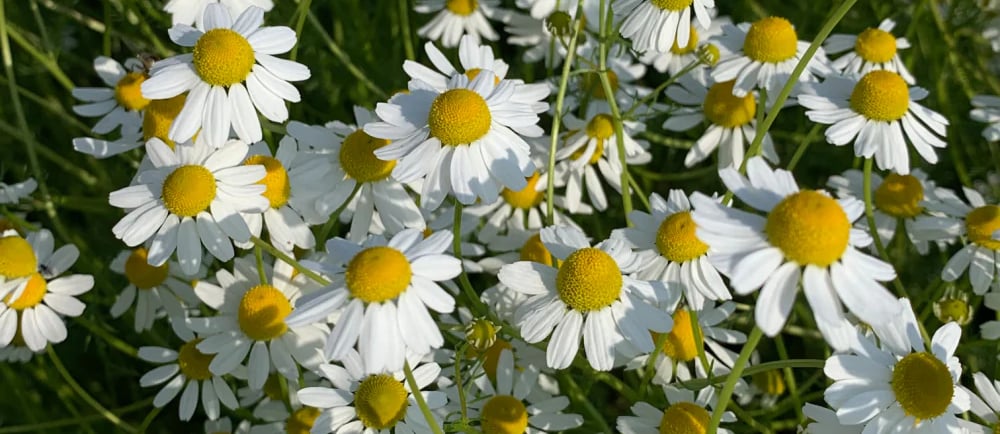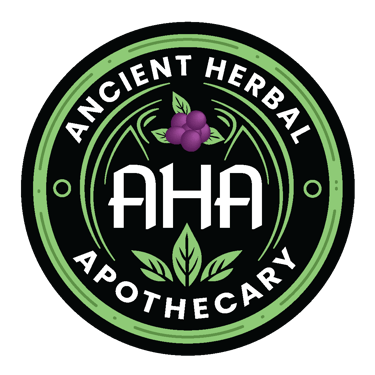Chamomile
Nature's Soothing Elixir
Luann Morris
5/24/20242 min read


The Marvels of Chamomile: Nature's Soothing Elixir
Chamomile, with its delicate white petals and gentle fragrance, has long been cherished for its myriad of health benefits and soothing properties. This humble herb, scientifically known as Matricaria chamomilla or Chamaemelum nobile, belongs to the Asteraceae family and is native to Europe, North Africa, and parts of Asia. Revered for centuries for its medicinal properties, chamomile continues to captivate enthusiasts with its versatility and efficacy.
Active Ingredients:
Chamomile contains a variety of active ingredients, including:
1. Chamazulene: This compound gives chamomile its characteristic blue hue and possesses anti-inflammatory properties.
2. Apigenin: A flavonoid with antioxidant properties, apigenin contributes to chamomile's calming effects.
3. Bisabolol: Known for its anti-inflammatory and skin-soothing properties, bisabolol is abundant in chamomile essential oil.
4. Matricin: Converted to chamazulene during the distillation process, matricin contributes to chamomile's anti-inflammatory effects.
Health Benefits:
Chamomile offers a wide range of health benefits, including:
1. Promotes Sleep: Chamomile tea is renowned for its calming effects, making it a popular bedtime beverage. Its mild sedative properties can help alleviate insomnia and promote restful sleep.
2. Relieves Digestive Issues: Chamomile tea is often used to soothe digestive discomfort, including bloating, indigestion, and gas. Its anti-inflammatory properties may help ease symptoms of irritable bowel syndrome (IBS) and other gastrointestinal conditions.
3. Reduces Anxiety and Stress: Chamomile's natural sedative properties can help reduce anxiety and stress, promoting relaxation and emotional well-being.
4. Soothes Skin Irritations: Chamomile's anti-inflammatory and antibacterial properties make it a popular ingredient in skincare products. It can help soothe skin irritations, such as eczema, psoriasis, and minor burns.
5. Supports Immune Health: The antioxidants found in chamomile may help boost the immune system and protect against oxidative stress.
Contraindications:
While chamomile is generally considered safe for most people, individuals with allergies to plants in the Asteraceae family, such as ragweed, marigolds, or daisies, may experience allergic reactions to chamomile. Additionally, pregnant women should consult their healthcare provider before consuming chamomile, as it may stimulate uterine contractions.
Chamomile Tea Recipe:
Making chamomile tea is simple and requires only a few ingredients:
Ingredients:
- 1 tablespoon dried chamomile flowers or 1 chamomile tea bag
- 1 cup hot water
- Optional: honey or lemon for flavor
Instructions:
1. Place the chamomile flowers or tea bag in a cup.
2. Pour hot water over the chamomile.
3. Steep for 5-10 minutes, depending on desired strength.
4. Remove the chamomile flowers or tea bag.
5. Sweeten with honey or add a squeeze of lemon, if desired.
6. Enjoy your soothing cup of chamomile tea!
Folklore:
Chamomile has a rich history steeped in folklore and tradition. In ancient Egypt, chamomile was dedicated to the sun god Ra and was used in various rituals and ceremonies. The Greeks and Romans revered chamomile for its medicinal properties, using it to treat ailments ranging from fevers to digestive issues. In European folklore, chamomile was associated with love and purification rituals, and it was believed to bring good luck and ward off evil spirits.
In conclusion, chamomile stands as a testament to the power of nature, offering a multitude of health benefits and a rich cultural heritage. Whether enjoyed as a comforting cup of tea or incorporated into skincare routines, chamomile continues to weave its gentle magic into our lives, soothing both body and soul.
